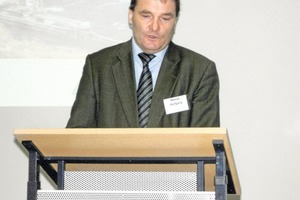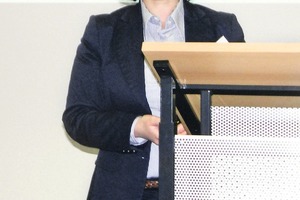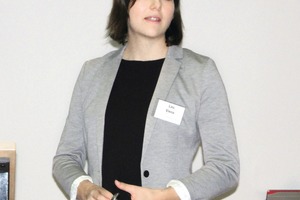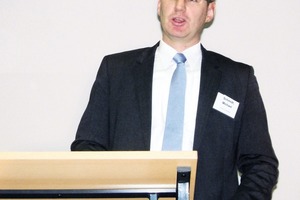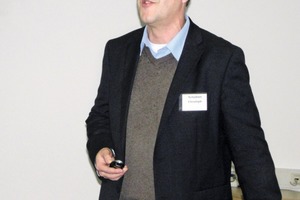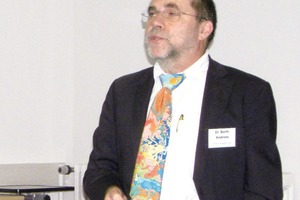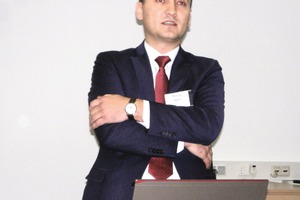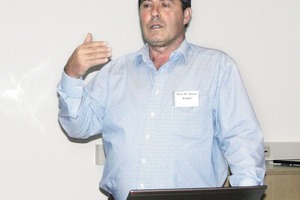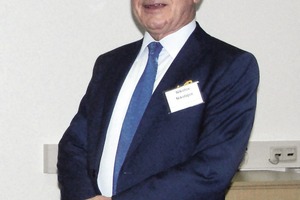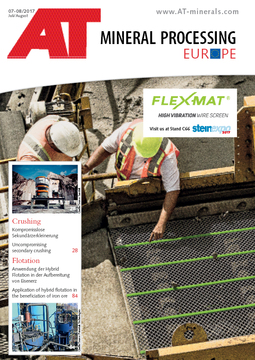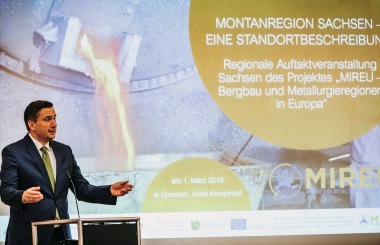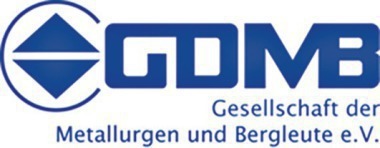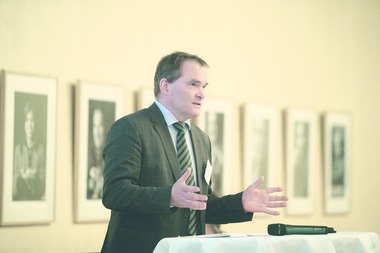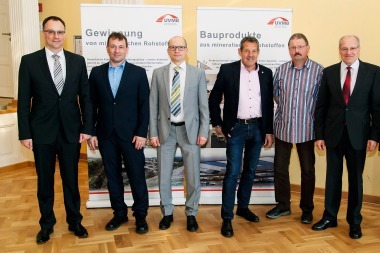Resources potentials in the Balkans – new and interesting territory for German industry
In his opening address, Dr. Reimer noted that the event was intended not only to provide information on the subject countries, but is, instead, also conceived as the starting point for a whole series of other events in which all the other countries are to be included. Dr. Reimer expressed the wish that Albania, Kosovo and Macedonia obtain membership of the EU, in order that they can be securely incorporated into strategies and contractual agreements.
The conference agenda adopted was based on the philosophy of focussing, on the one hand, on mineral resources and also, on the other hand, examining so-called “niches” (e.g. geo-tourism) and discussing the experience of various entrepreneurs. This is intended to disclose not only potentials, but also weaknesses which could be of great importance for future utilisation of the resources accessed. The aim of the event, as Dr. Reimer stated, is that of continuing the guiding spirit of previous information events on geo-resources. This was then to be followed by far-reaching, systematic market exploration.
Dr. Reimer also made a brief statement on the BMWi’s market development programme on behalf of the unfortunately incapacitated ministry speaker. The target, he commented, is the small and medium-sized enterprises so important in Germany (SMEs as part of total business entities: approx. 98 %). Two paths are open: either bring the target market to Germany, or enter the target markets, in order then to achieve initial business volumes.
Industry-policy boundary conditions and market experience
In the first paper of this block, Maxi Hinze, of the Association of German Chambers of Commerce and Industry, Berlin, threw light on the economic situation in the countries in question with her deliberations on “Economic development in Albania - Kosovo - Macedonia”. A positive trend is apparent in Albania (growth in GDP in 2016: planned 3.3 %, realistically achievable - probably 4 %), and there are good opportunities for foreign subsuppliers. Major projects for the modernisation of the energy and transportation infrastructures have also been initiated. The country’s most important trading partner is Italy, with Germany currently playing only a minor role.
The core message in Kosovo is that of positive economic development. Growth in GDP of 4 % is planned for 2016. Rising import figures and an increase in direct foreign investments are characteristic of modern-day Kosovo. Unlike the situation in Macedonia, however. Here, prospects of growth are clouded by internal political crises, also leading to loss of confidence on the part of investors. A small redeeming feature is the country’s burgeoning private consumption. Germany is Macedonia’s biggest trading partner.
Elena Lau examined the activities of the German Agency for International Cooperation (GAIC) for sustainable economic development in the three Balkan countries, and outlined potentials for cooperation with German industry. The projects initiated by the GAIC in Albania, Kosovo and Macedonia are all orientated around EU integration. Very many major projects have been started in the first two countries, but predominantly only regional projects in Macedonia. More detailed deliberations focussed on Kosovo, which has the advantage of being home to many German-speakers. The “Industrial Minerals” (halloysite, magnesite, talc, diatomite, bentonite) sub-project within the overall COSiRA funding programme, for which the German Foreign Office provided 100 000 € in 2016, was examined. Here, local economic chains are to be set up and the initiation of supply relationships with German companies promoted.
In his address, Michael Schmidt, of INEAST Consulting, Bonn, assessed the potentials and risks for an entrepreneur entering the Balkan markets. He firstly defined the Balkan economic region and rather provocatively posed the question of whether the Balkans are a market or a mystery. This speaker outlined the common features and the differences of the individual countries, all of which must under all circumstances be taken into account if entering these markets. The business environment was characterised as “difficult” (corruption), but also as indeed controllable, under certain conditions. Schmidt also provided valuable tips concerning business practices (preference for oral communication, negotiations in a relaxed atmosphere, avoidance of political topics when in large groups, gifts considered perfectly normal tokens of respect). The education system is currently in a state of flux, and the available training opportunities are not orientated around the needs of industry and the infrastructure. Potentials are perceived here via the utilisation of German industry’s study programmes, for instance, those involving “dual” training in-country and in Germany. This speaker, in closing, also mentioned partners available for market entry, such as the various embassies and consulates, for example, and associations such as the Chambers of Commerce, the Association of German Chambers of Commerce and Industry, FGC and the Federal Association for Wholesaling, Foreign Trade and Services; the federal economics ministry and the Federal Office of Economics and Export Control, among others, can also act as financing partners. The important thing, Schmidt emphasised, is to recognise the advantages possessed by the Balkans: these countries have European roots and are effectively right on Europe’s doorstep, a fact of great significance for SMEs, due to the significantly lower expense and complexity involved compared to countries such as Chile and China, for instance.
Industrial experience and fields of business
Christoph Scheibert, of GEOCON Jena, opened this block of papers with his remarks on “Market access as a first step - the experience of a geo-consultant in international business”. Scheibert reported on various activities by his company in the most diverse range of countries (the Emirate of Qatar, Vietnam, Russia, the Balkans) in the form of services or projects since 1989. Market-accessing activities in the target countries were assessed as extremely sobering: there have, up to now, been no projects, only costs and a few cooperation arrangements. One encounters many stumbling blocks, particularly in the case of services in the environmental sector: unreliable partners, unfairness and deception, constantly changing contacts and expectations of prejudice. Spreading knowledge of one’s company is, nonetheless, a positive factor, despite all this. Another dilemma is the fact that a consultancy is not accompanied by financing. but must, instead, be paid. And so this speaker reminded his listeners: “Germany spends a lot of money on development in the various countries, but does nothing to ensure that this money flows back in the field of consulting.”
Dr. Andreas Barth, of BEAK Consultants, of Freiberg, had positive experience to report, and asked right at the start of his paper the question of “Is Kosovo ready for mining-sector investments?”. As Barth noted, the government has created in exemplary fashion the preconditions for the setting-up of an extensive information system jointly with the colleagues from Kosovo. The data-bases compiled (deposit surveys, mining survey records, mining permits) have been used to draft corresponding geological maps. The speaker reached the following conclusions:
Kosovo
has a significant mineral-resources potential
regards mining as a key economic factor
is making great efforts to attract investors
possesses a unique compilation of geological and geo-economic data
has created excellent legal boundary conditions
It is thus unequivocally clear: Kosovo is ready for investments in mining.
These statements were confirmed by Azem Rexhaj, member of the Supervisory Board of Kosovo’s “Independent Commission for Mines and Minerals”, in his paper, entitled “The mining sector in Kosovo – Mining developments, infrastructure, energy and legal boundary conditions”. This speaker used a geological map of Kosovo to provide a comprehensive overview of the nature, quantities and distribution of its mineral resources (examples: 12.5 billion t of lignite, 60 million t of Pb and Zn, 13 million t of Ni). A regulation authority responsible for licensing, approvals and tariffs is active in the energy sector. Current and planned energy capacities indicate that there will be no energy problems in the mining sector. The speaker assessed the transport infrastructure as “very good”, with new projects for transport links to Central Europe already planned. Further deliberations concerned approval procedures and official charges (royalties and exploration fees).
In his address, under the title “Geo-tourism in the Balkans – an economic field with a future”, Gezim Tarko, of the Tarko Ada travel agency, Tirana, transported the audience to the enchanting landscapes of Albania, at the same time focussing on one of the niche markets mentioned initially. This speaker described a week-long geological tour, which was held in June 2016 and aroused a great response. Tarko noted that tourism is thriving, with still more tours planned.
The mineral-resources industry
Prof. Dr. Kujtim Onuzi, of the Tirana Institute for Geosciences, Energy, Water and the Environment provided in his paper a geological and mineral-resources portrait of Albania. He gave a comprehensive overview of the country’s geology, examining the main mineral-resources groups (ores, non-metal resources, energy resources) in detail, and derived from this the need for action and the potential for cooperation. Good cooperation has existed with Germany in the field of science, with BEAK Consultants GmbH, of Freiberg, for example, and GEOS Jena. This speaker also expressed the wish that the German government provide German companies with the necessary funding to enable them to invest in Albania.
In his “Introduction to Macedonian mining”, Nikolajce Nikolov, president of the Macedonian Mining Association in Skopje, provided a detailed overview of Macedonia in general and of the country’s mining sector, in particular. Macedonia has rich reserves of ores and minerals, a major percentage of which is not yet being exploited. A small portion is now being explored, but new mining companies also need to be established. The main mineral source of energy is lignite, which supplies 70 % of energy needs. In the case of ores, there are at present thirteen concessions for mining, although only four are actually operated. The non-metallic mineral resources (marble, kaolin, limestone and clay) are used in production of building materials. Permits for mining in quarries are issued without any real system, and there are also serious environmental problems. There has, up to now, been no national mineral-resources strategy. In closing, this speaker showcased the Bucim open-cast mining operation, the country’s most important producer of Cu, Au and Ag. A new preparation facility which permits the production of a 99.9995 % Cu from an ore containing only 0.24 % Cu was installed in 2012.
This block of papers was concluded by the remarks of Arthur Furriku, of Arsi Sh.p.k., Tirana (a 100 % subsidiary of the Arsi mining and minerals corporation, Berlin), concerning the mining of chromium ore in Albania. Research will be a vital necessity, since there are also deposits of Au, Pt and rare earths. The deposits are easily accessible, there is little population in the vicinity, and the environmental requirements are therefore only moderate. Investments, including investments in environmental protection, are an urgent necessity.
Concluding remarks
Dr. Reimer was able to ascertain with satisfaction that the response to this information event had been very pleasingly high. The lively discussions which took place also underlined the interest in corresponding initiation of business on the new markets examined here. The more than forty attendees were thus also a good sign, since they will act as information disseminators. The organiser would have appreciated the involvement of the major industrial associations, such as the German Engineering Federation and the Federation of German Industries, for example, who could then have informed their members correspondingly and at first hand. As Dr. Reimer emphasised, these groupings have to this extent failed here in their duty as umbrella associations. Another positive factor is the distribution of mineral-resources studies for Albania and Macedonia, and of the BMWi’s information sheets on market access for SMEs, with corresponding funding focuses for the interested enterprises and other participants. So: all-in-all an event which participants will have found worthwhile and which met the wishes of the BMWi for facilitation of entry to new markets for SMEs, self-employed professionals in commercial industry and specialised self-employed persons and service-providers with business operations in Germany.

